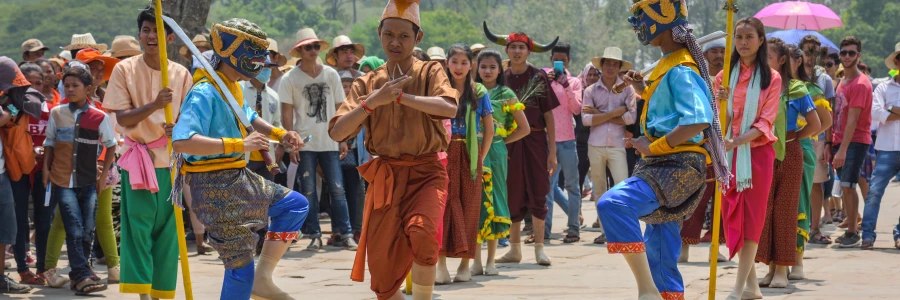
Khmer New Year
Posted on Sunday, 13 April 2025 under Culture and Belonging,
From Monday 14 April to Wednesday 16 April, Cambodia is celebrating their new year.
This celebration, which is also a public holiday, is known as Choul Chnam Thmey or Moha Sangkranta which signifies the start of the solar new year
You'll see people dress in colourful traditional clothing, dance, and play games, and they'll leave offerings being left at pagodas for their departed ancestors. In Phnom Penh, the capital of Cambodia, there's a large parade with floats, music, and performances.
There are three distinct days with different meanings throughout Khmer New Year.
- Maha Songkran (មហាសង្រ្កាន្ត) - the first day, for presenting fruit as an offering to the gods
- Virak Vanabat (វិរ:វ័នបត) - the second day, for visiting relatives, give gifts, and share a meal together
- Vearak Loeng Sak (វារៈឡើងស័ក) - the third day, for cleaning
Did you know
- Cambodia is bordered by three countries; Thailand, Laos, and Vietnam.
- Cambodia has a tropical climate with a rainy season and a dry season. In the lowlands in the centre of the country, temperatures rarely drop below 27 °C.
- The Khmer ethnic group makes most of the population, and the remaining population is Chinese, Vietnamese, and Cham people.
- Buddhism is the main religion, but many also follow ancient folk religions. Almost 80 percent of the population lives in rural areas.
- Dense forests cover more than half of Cambodia. Rice paddies, fields of crops, and grasslands cover the central plain.
- Cambodia’s northern forests contain elephants, wild oxen, and monkeys. Birds native to Cambodia include herons, pelicans, cormorants, and pheasant. The country also has crocodiles and cobras.
Meeting and greeting in Cambodia
- Cambodians traditionally greet each other with palms together, similar to if they are praying. They lift up their hands and bow slightly. This is called sampeah.
- The higher the hands are held, the more respect is being shown. Friends of the same age are greeted with hands at chest level, parents and older people are greeted with hands slightly higher, and hands at the forehead level are exclusively reserved for praying to gods or sacred statues.
- When meeting, they sampeah and say Choum Reap Sur (Hello)
- When leaving, they sampeah and say Choum Reap Lir (Goodbye)
- When sampeah is used when greeting you, it's polite to sampeah in return




